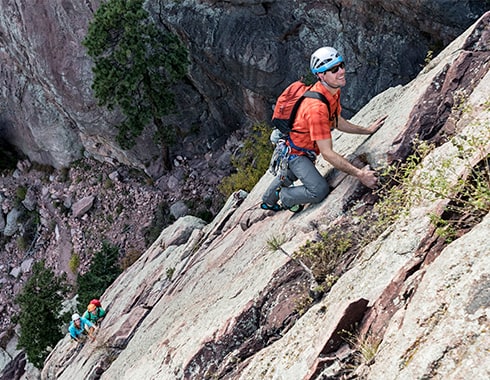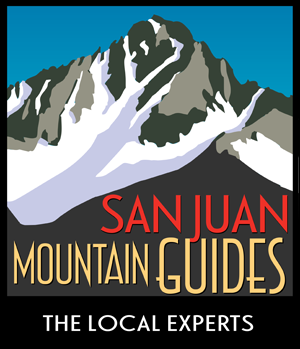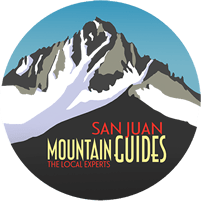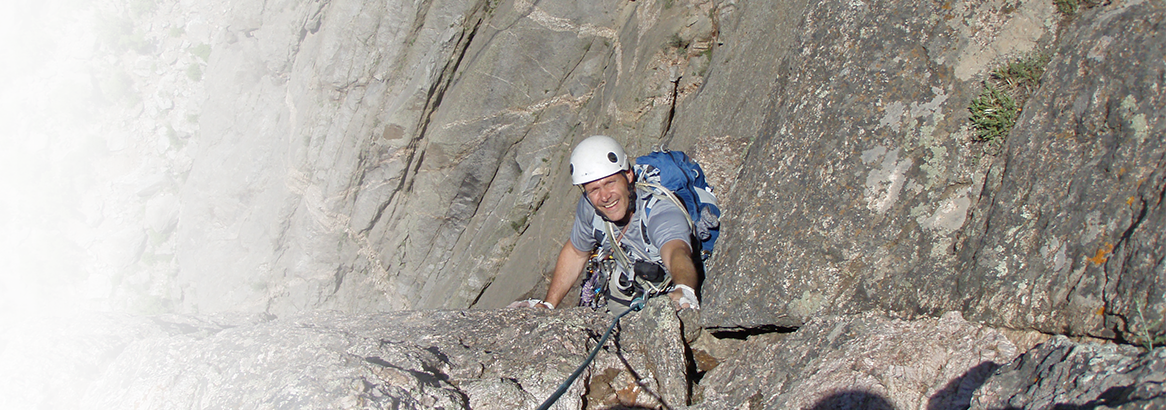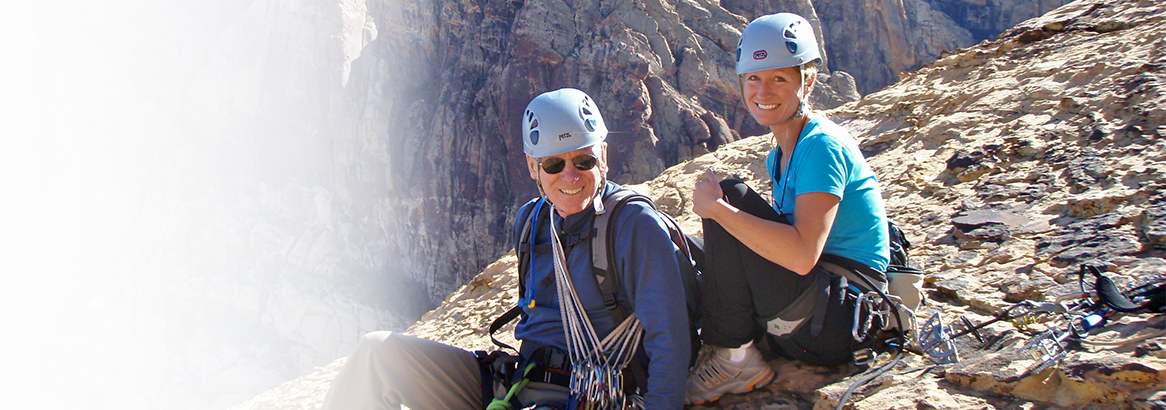Essential Techniques for Self or Partner Rescue
Rock climbing involves a range of hazards and complexities. Once off the deck, retreat can be as simple as lowering to the ground or as complex as multiple tandem rappels with an injured partner. Rock Self-Rescue is a course to give you a tool kit for dealing with the spectrum of circumstances climbers can encounter. This isn’t an organized rescue course, we’ll focus on tools you’ll already have readily available on a normal day of climbing. Defeating a plaquette and lowering the follower, improvised ascension, and descending with an injured partner are only of few of the topics we’ll develop a tool kit for.
This course is designed to introduce recreational climbers to self-rescue concepts and approaches. Participants should leave this course with a basic skill set enabling them to execute simple self rescues with understanding of the fundamental concepts allowing them to approach more advanced self rescue courses. We offer both a 1 day and a 2 day option for this program.
For fixed date courses, the venue for this program is Boulder, CO and the classic Eldorado Canyon which offers a wide variety of terrain and climbing routes of various difficulty. We can also offer this course in both Ouray and Durango, CO on a private/custom basis.
Participant Goals for the Course
At the conclusion of the 1 or 2 day day Self-Rescue Course participants will have gained proficiency in the following skills:
Build and equalize traditional anchors
Clean bolted anchors to a rappel
Rappel in multiple stages
Defeat a weighted plaquette and lower
Configure a 3:1 hauling system
Utilize improvises rope ascension techniques
Essential equipment for your climbing rack
Pass a knot and perform tandem/counterbalance rappel
2024 Dates
Reach out to set up custom Rock Rescue course. Minimum 2 people.
Costs
$499 per person
No Hidden Fees
Includes:
- Guiding and instruction with an AMGA Certified/Trained Guide
- All rock climbing gear (harness, helmet, rock shoes, etc.)

Self-Rescue Course Itinerary
Day 1
Itinerary Note: Participants may sign up for either Day 1 only or both days of the Self Rescue Course itinerary.
Meet your guide at 0800 at the entrance to Eldorado Canyon State Park. Your Course Leader will give you a quick briefing, help you fill out a couple forms, and fit you in whatever demo equipment you might need.
A short hike will take you to the rock climbing venue where you will begin the days instruction. We’ll start with an introduction to basic climbing gear (helmets, harnesses, carabiners, rock shoes, etc.) and move straight into knots and belay/rappel setups. The day will progress with plenty of climbing and “hands on” application of the topics for the course. The day will finish up no later than 4:00 pm.
Day 2
Course participants will meet at 0800 at the entrance to Eldorado Canyon State Park. Review fundamentals from Day 1, then the group will move into the topics of anchoring, top rope setups, additional knots/hitches, and of course – plenty of rock climbing. At the conclusion of the course, your instructor will give you personal feedback regarding your potential next steps in the climbing progression.
We have honed our curriculum and itinerary through many years of ice climbing instruction. These courses offer a great way to introduce yourself to the sport of rock climbing in a fun, more affordable group atmosphere.

Rock Climbing Equipment List
| Backpack | Description | Guide's Pick |
|---|---|---|
 | The Osprey Mutant 38 represents an excellent all around performer for Ice Climbing trips in the Ouray Ice Park and surrounding San Juan backcountry. |
| Water Bottles | Description | Guide's Pick |
|---|---|---|
 | We recommend wide mouth Nalgene (or similar) water bottles for the majority of our programs. Two 1 liter bottles is the standard for days in the mountains. |
| Personal Food | Description | Guide's Pick |
|---|---|---|
 | Lunch begins when breakfast ends and ends when dinner begins. Bring what you like to eat and consider the length, relative difficulty, weight, and other factors when deciding what to bring in the mountains with you. A variety is always best. Don't be afraid of Mr. T. |
| Sunscreen | Description | Guide's Pick |
|---|---|---|
 | Essential for all of our programs. SPF 30 would be our minimum recommendation. Typically a 4 oz. bottle will suffice but consider trip length when deciding how much to pack. |
| Belay Device | Description | Guide's Pick |
|---|---|---|
 | A belay device is a required item on any of our technical climbing or mountaineering courses. While not necessary to have the Guide ATC specifically, we think owning one of these offers additional versatility as you progress and gain additional knowledge about the various levels of functionality provided by a device of this type. |
| Harness | Description | Guide's Pick |
|---|---|---|
 | The BD Aspect Harness is a great all around performer for all types of climbing - ice, rock, alpine etc. The adjustable leg loops and integrated ice clipper loops make this a solid investment as your do-all harness. |
| Locking Carabiners | Description | Guide's Pick |
|---|---|---|
 | We recommend at minimum 2 - 3 personal locking carabiners on our climbing courses and any technical private guided program. We prefer classic screw gate carabiners over other types of locking mechanisms. |
| Climbing Helmet | Description | Guide's Pick |
|---|---|---|
 | A versatile, hybrid-shell helmet for lightweight protection in any discipline, the Vector features excellent ventilation and a ratcheting adjuster. |
Training & Follow Up Climbs
As always, being in excellent physical shape is an important component of our our programs. A good mixture of cardiovascular fitness, muscular fitness, and especially core strength will help you to maximize the potential rewards that are possible on a great climbing trip.
Specific to Rock Climbing – it is a great idea to experience rock climbing in a gym first prior to your first experience outside!
Before Your Trip
Familiarity with basic climbing principles such as knots, belaying, rappelling, and other climbing techniques can be very helpful for our Intro Course participants. Though not required, prior gym climbing experience will help you to acquire and assimilate the information covered in our rock climbing course progression as quickly as possible.
Follow Up Climbs

Boulder, Colorado: Getting There
Boulder, Colorado is located in the Northeastern part of Colorado and approximately 30 minutes from Denver International Airport. A mecca for climbing, hiking, cycling, and foodies; make sure you plan to spend some time in town before and after your SJMG trip. Boulder, CO serves as the launching point for all of our rock climbing courses and climbs in the Front Range.
*If you are planning to combine additional days of climbing in Eldorado Canyon or The Flatirons then Boulder, CO is also a logical place to base your lodging for your trip.
![]() The best option for flying to the area is to fly into Denver, CO. Many airline options exist, and because Denver is a major airline and travel destination there are typically many one-way flights to choose from.
The best option for flying to the area is to fly into Denver, CO. Many airline options exist, and because Denver is a major airline and travel destination there are typically many one-way flights to choose from.
![]() You will likely need a to organize a rental car to drive to Boulder, CO from Denver. Typically in the summer months you can choose any type of vehicle but in the spring and winter months please consider that weather can change rapidly in the mountains so an All Wheel Drive or Four Wheel Drive vehicle is worth considering. Below are some approximate driving times to get to Boulder, CO.
You will likely need a to organize a rental car to drive to Boulder, CO from Denver. Typically in the summer months you can choose any type of vehicle but in the spring and winter months please consider that weather can change rapidly in the mountains so an All Wheel Drive or Four Wheel Drive vehicle is worth considering. Below are some approximate driving times to get to Boulder, CO.
- Denver, CO: 30 minutes
- Estes Park, CO: 45 minutes
- Colorado Springs, CO: 2 hours
![]() Boulder, CO also has a number of great hotels, suites, and vacation rentals for you to stay in while you’re in the area. Give our office a call at 800-642-5389 if you have any questions about what would suit you best for this trip!
Boulder, CO also has a number of great hotels, suites, and vacation rentals for you to stay in while you’re in the area. Give our office a call at 800-642-5389 if you have any questions about what would suit you best for this trip!
Program Policies
Registration & Cancellation
Advance Registration is required for this program. You have the option to either call our office and register via phone or utilize our secure Online Reservation System. All participants must read and sign an Assumption of Risks/Liability Waiver and agree to our Reservations and Cancellations Policies.
Inclusions
- Guiding and Instruction with an AMGA Certified/Trained Guide
- All rock climbing gear (harness, helmet, rock shoes, etc.)
Exclusions
- Transportation to Boulder, CO
- Hotel costs before, during, or after the program
- Guide gratuity
- Lunch food or snacks
- Personal hiking/climbing clothing
- Trip Cancellation Insurance (recommended)
- Costs associated with weather delays or other variables beyond the control of San Juan Mountain Guides

Book This Trip!
We Offer Online Registration
- Click on Book This Trip
- Select your Program dates
- Enter your Info and Payment
Or, call 800.642.5389 to register
